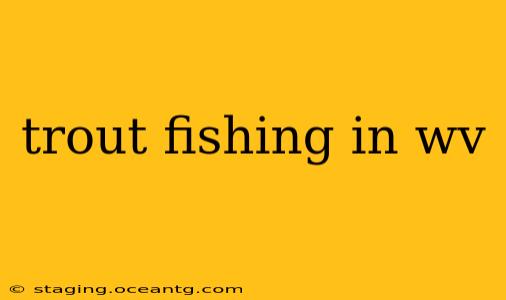West Virginia, known for its stunning natural beauty and abundant wildlife, offers some of the best trout fishing in the eastern United States. From pristine mountain streams to larger rivers, the state boasts diverse habitats teeming with rainbow, brown, and brook trout. Whether you're a seasoned angler or a beginner casting your line for the first time, West Virginia's trout fishing opportunities are sure to captivate. This comprehensive guide will help you plan your next unforgettable fishing adventure.
What are the best places to trout fish in West Virginia?
West Virginia's extensive network of rivers and streams makes pinpointing the best locations a matter of personal preference and the type of fishing experience you seek. However, some consistently popular and productive spots include:
- The Cacapon River: Known for its wild brown trout population and scenic beauty, the Cacapon River offers a challenging and rewarding fishing experience.
- The South Branch Potomac River: This river system is renowned for its large brown trout and offers various fishing access points.
- The New River: While known for other species, the New River also holds populations of trout, particularly in its headwaters and more remote sections.
- The Cheat River: This river system is known for its robust populations of both brown and rainbow trout.
- Numerous smaller streams and tributaries: Throughout the state, countless smaller streams and tributaries offer excellent opportunities for solitude and encounters with native brook trout. Many of these are located within the state's extensive forest system.
What time of year is best for trout fishing in West Virginia?
The best time for trout fishing in West Virginia depends on the specific species and location, but generally, the spring and fall offer ideal conditions.
- Spring: As water temperatures rise after the winter, trout become more active and feed aggressively.
- Fall: Cooler temperatures and the fall foliage make for a beautiful and productive fishing experience.
- Summer: Summer fishing can be productive, but higher water temperatures can make trout less active in some areas. Fishing early in the morning or late in the evening is often more successful during the summer months.
- Winter: While fishing is possible during winter, it can be more challenging due to cold water temperatures and potentially icy conditions.
What are the best lures and bait for trout fishing in WV?
The most effective lures and bait for West Virginia trout vary depending on the time of year, water conditions, and the specific species you're targeting. However, some consistently successful options include:
- Small spinners: These are effective for attracting trout with their flashy movement.
- In-line spinners: These versatile lures are suitable for various fishing conditions.
- Dry flies: These are excellent for surface fishing during calmer conditions.
- Nymphs: These underwater flies mimic aquatic insects, which trout feed on.
- Worms: A classic bait that remains effective for trout fishing.
- Salmon eggs: These are another popular and effective bait choice.
What kind of fishing license do I need for trout fishing in West Virginia?
To legally fish for trout in West Virginia, you need a valid West Virginia fishing license. You can purchase these online or at various retail locations. Be sure to check the West Virginia Division of Natural Resources website for the most up-to-date licensing information and regulations. Remember to familiarize yourself with specific regulations for the areas you plan to fish, as some may have additional requirements or restrictions.
Are there any regulations I need to be aware of?
West Virginia has specific regulations regarding trout fishing, including size and creel limits. These regulations are designed to protect trout populations and ensure sustainable fishing for future generations. Always check the West Virginia Division of Natural Resources website for the most current regulations before your trip. Key regulations often include:
- Size limits: Minimum and maximum sizes of trout that can be kept.
- Creel limits: The maximum number of trout an angler can keep in a day.
- Catch-and-release regulations: Certain areas may require catch-and-release fishing to protect sensitive populations.
- Gear restrictions: Some areas may restrict the types of fishing gear allowed.
What should I pack for a trout fishing trip in West Virginia?
Packing appropriately is crucial for a successful and enjoyable trout fishing trip. Here's a suggested packing list:
- Fishing rod and reel: Choose gear appropriate for the type of fishing you'll be doing.
- Lures and bait: Pack a variety of options to adapt to different conditions.
- Tackle box: Keep your hooks, weights, and other small items organized.
- Waders (optional but recommended): Waders allow you to access deeper pools and wade across streams safely.
- Appropriate clothing: Dress in layers to adapt to changing weather conditions.
- Sun protection: Wear sunscreen, sunglasses, and a hat.
- Insect repellent: Protect yourself from mosquitoes and other biting insects.
- Food and water: Staying hydrated and energized is essential for a long day of fishing.
- First-aid kit: Be prepared for minor injuries.
By following these guidelines and preparing adequately, you can greatly enhance your chances of a successful and memorable trout fishing experience in West Virginia. Remember to practice responsible fishing and always adhere to state regulations. Tight lines!
